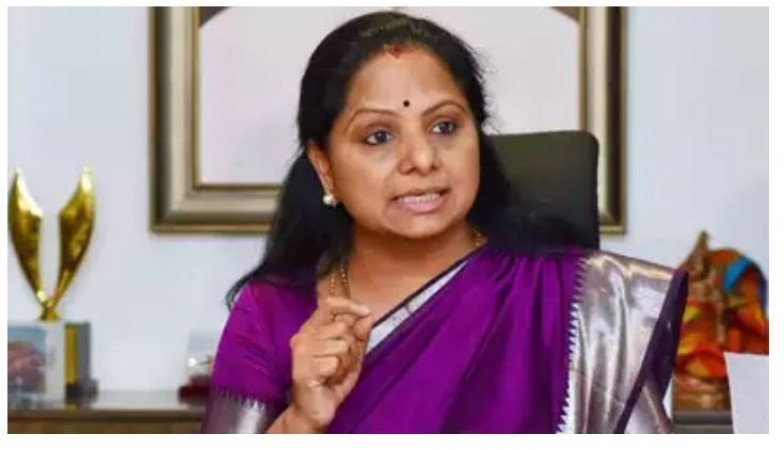
NEW DELHI: The daughter of Telangana Chief Minister K. Chandrashekar Rao and MLC for the Bharat Rasthra Samithi (BRS) get a new summons from the Enforcement Directorate (ED) on Thursday, March 17, asking her to participate in its continuing investigation into the Delhi excise policy case on March 20. In response to Kavitha's refusal to appear at the ED interview on Thursday, citing an ongoing Supreme Court petition, the federal agency issued a new summons.
Kavitha's absence from the third round of ED questioning served as a signal to the investigation team that the case is still being heard by the Supreme Court. The sources claim that Kavitha has supplied the required paperwork requested by the investigation team via her attorney.
Because she was allegedly a crucial player in the south cartel, the ED had called her earlier this month and asked her to appear before it on Thursday in the Delhi Excise scandal. The BRS leader had petitioned the Supreme Court for an urgent hearing, arguing that since she is a woman, the investigatory body's officials must go to her instead of summoning her to the ED office.
The Supreme Court had agreed on Wednesday to hear her appeal against the ED summons but had declined to provide her temporary relief.
In the Delhi Excise Policy Case, the Supreme Court has consented to hear her petition on March 24. Kavitha petitioned the Supreme Court, arguing that by law, an ED cannot summon a woman for questioning while the official is present; instead, the questioning must take place at the lady's home.
The attorney for Kavitha said that it is "absolutely against the law" for ED to have brought a lady for interrogation at this time. An urgent hearing on Kavitha's petitions was requested by her attorney before a bench presided over by Chief Justice of India DY Chandrachud. On March 24, the court decided to list it.
Arun Ramchandra Pillai, a businessman from Hyderabad who was detained on March 6 night in connection with the crime, would be confronted by Kavitha, according to reports.
As a result of its investigation, ED has learned that Pillai is a major figure in the overall fraud that involved the payment of significant bribes and the creation of the largest cartel in the South Group.
The South Group includes the Telangana MLC Kavitha, the Aurobindo Group promoter Sarath Reddy, the Ongole, MP Magunta Srinivasulu Reddy and his son Raghav Magunta, among others. According to the federal agency inquiry, Pillai, Abhishek Boinpalli, and Butchi Babu were representing the South Group.
Pillai was working closely with his associates to carry out the agreement reached between the South Group and the head of the Aam Aadmi Party (AAP) According to an ED probe, Pillai was complicit and participated in the kickbacks from the South Group and their recovery from Delhi-based enterprises.
The South Group handed AAP politicians kickbacks worth Rs 100 crore, as per earlier claims made by the ED.
According to information, Pillai owns a 32.5% stake in Indo Spirits, which holds an L1 licence. Arun (32.5%), Prem Rahul (32.5%), and Indospirit Distribution Limited (35%) are partners in the business known as Indo Spirits. Arun and Prem Rahul represented the benami investments of Kavitha and Magunta Srinivasulu Reddy and his son Raghava Magunta.
A partner in Indo Spirits is Pillai. Pillai acted as Kavitha's representative in this partnership firm. The Central Bureau of Investigation (CBI) questioned Kavitha, a Telangana Legislative Council member, in the same case in December of last year.
ED submitted its initial chargesheet in the matter last year. According to the agency, it has so far conducted around 200 search operations in this case after filing a FIR and taking cognizance of a CBI case that was opened on the lieutenant governor of Delhi's recommendation.
According to officials, prima facie evidence of violations of the GNCTD Act of 1991, the Transaction of Business Regulations (ToBR) of 1993, the Delhi Excise Act of 2009, and the Delhi Excise Rules of 2010 was shown in the Delhi Chief Secretary's report, which was submitted in July.
Following the arrest of Sameer Mahendru, Managing Director of Delhi's Jor Bagh-based liquor distributor Indospirit Group, in the case, the ED conducted raids at over thirty different sites in Delhi and Punjab in October and later arrested him. Early this week, the CBI also submitted its initial charge sheet in the case.
The ED and the CBI claimed that improper actions were taken when changing the Excise Policy, that licence holders received improper favours, that the licence fee was waived or lowered, and that the L-1 licence was prolonged without the responsible authority's consent. In order to avoid detection, the recipients produced fictitious entries in their books of accounts and channelled "illegal" gains to the charged authorities.
According to the accusations, the Excise Department made the unapproved decision to reimburse a winning tenderer for their approximately Rs 30 crore earnest money deposit. Despite the lack of an enabling provision, COVID-19 permitted a waiver of the tendering licence payments from December 28, 2021, to January 27, 2022.
The exchequer is said to have suffered a loss of Rs 144.36 crore as a result, and an investigation has been launched on the recommendation of Delhi Lieutenant-Governor Vinai Kumar Saxena and in response to a referral from the Union Home Ministry.
Delhi excise policy case: Kavitha to appear before ED today
KCR to address massive public meeting in Maharashtra on March 26
Delhi Excise Policy Case: ED summons Telangana CM KCR's daughter K Kavitha